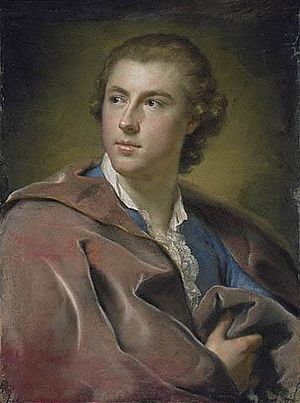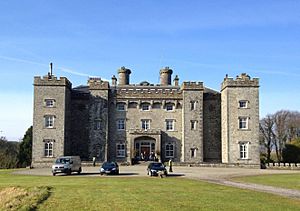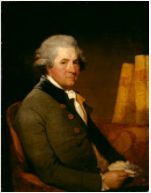William Burton Conyngham facts for kids
Quick facts for kids
William Burton Conyngham
|
|
|---|---|

portrait by Anton Raphael Mengs (1754/1755)
|
|
| Member of the Parliament of Ireland | |
| In office 1761–1796 |
|
| Personal details | |
| Born | 1733 |
| Died | 31 May 1796 |
| Parent |
|
William Burton Conyngham (born 1733 – died 31 May 1796) was an important Irish politician. He was also known as an "improver" because he helped develop new places and ideas.
Contents
Who Was William Burton Conyngham?
William Burton Conyngham was born in 1733. His original name was William Burton. He was the second son of Francis Burton and Mary Conyngham. Mary was the sister of Henry Conyngham, who was a very important person called the 1st Earl Conyngham.
A New Name and Family
In 1781, William changed his name to William Burton Conyngham. He did this with a special permission called a Royal Licence. This allowed him to inherit the large family properties from his uncle.
His Time in Politics
William Burton Conyngham was a Member of Parliament for a long time. A Member of Parliament (MP) is someone elected to represent people in the country's government. He served in the Parliament of Ireland.
- From 1761 to 1777, he represented a place called Newtown Limavady.
- He also represented Killybegs from 1776 to 1777, and again from 1783 to 1790.
- Between 1776 and 1783, and then from 1790 to 1796, he was an MP for Ennis.
From 1793, William also worked as one of the Commissioners of the Treasury for Ireland. This meant he helped manage the country's money.
Building New Places
William Burton Conyngham was very interested in developing new areas. He had a big vision for a small island and a grand castle.
The Island of Rutland
William planned to build a settlement on Rutland, Ireland, an island that had no people living on it before. Starting in 1784, he created a street with homes and shops. He also added a post office, a school, and a place for fishing boats to land and process their catch.
The village he started on Rutland Island was lived in until the 1960s. The town on the mainland, which served as the main port for Rutland, is still called Burtonport today. It is named after him!
Slane Castle
In 1785, William Burton Conyngham started building Slane Castle. His nephew, the 1st Marquess Conyngham, helped him with this project. The castle was built in a beautiful spot overlooking the River Boyne. This river is famous for the Battle of the Boyne, which happened just a few kilometers away.
The Famous Trinity College Harp
William Burton Conyngham is perhaps most famous today for a special gift he gave. He presented the Trinity College Harp to Trinity College Dublin, a very old and famous university.
This harp became incredibly important to Ireland.
- From 1922, the harp was used as the design for the official symbol of the Irish Free State.
- It is still used today as the symbol for the Republic of Ireland.
- An image of this harp was also registered as a trademark by the Guinness company in 1876.
 | Toni Morrison |
 | Barack Obama |
 | Martin Luther King Jr. |
 | Ralph Bunche |



